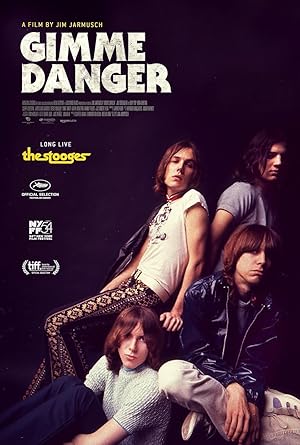
Gimme Danger Page #8
I went down there and met this
th-this manager, Tony Defries.
I met David, who was... cool.
They were going back to England,
I went back to Detroit
and there an, there was an understanding
that at a later date
um, they would arrange,
uh, for me to go to London
and make some sort of a recording.
[bells chiming]
They had somehow and someway
signed me to something
and, uh, using that in turn, uh
uh, s-signed a deal
whereby they got some money
from Columbia for my services.
Like that chick Pebbles
that signed up TLC
or, uh, Lou Pearlman
with the boy band "NSYNC."
It was one of those contracts.
It was in-insane work demands
uh, ridiculous splits
of money. Uh..
I didn't really understand...
...who owned what, with who I,
with whom I was signed.
I was in the big bad world now,
I was not..
I-I-I was not the, uh, uh..
I wasn-I wasn't
This fella, Tony Defries, what I thought
was gonna be an effective,
and was an effective flamboyant
theatrical management style
based on Colonel Tom Parker
with the big cigar
big Afro hair,
and a great big mink coat.
But in the interim I decided
I wanted to re-retain
my Detroit identity
and, uh, told them in advance
"You gotta bring
James Williamson with me."
[rock music]
Alright
Whoo
(James) I guess he was trying
to capture the attitude
that I had, which I did
have quite a bit of attitude
when I first started, uh, out.
You know, I didn't really
have any framework for anything
I was, what? You know,
not even twenty years old yet.
And I, um, I didn't have any skills.
And so, all I could do
was play the guitar.
I went from living
on my sisters couch
literally, to getting
a phone call from Ig and saying
"You know, tomorrow,
we have a plane ticket for you
and you're going to London."
Right?
And so I-I just, I-I
I got my guitar and I left
and my sister didn't
even know where I was.
You know, I mean, my girlfriend
called and-and she goes
"Well, I don't know where
he is" and-and the girl goes
"Well, is his guitar there?"
And she said, "No" And she goes
"Alright, he's gone."
(Iggy) So James and I got to
Heathrow, and, uh, you know
and the cops took
one look at us and thought..
"Undesirable, no money.
What are you doing?
"What do you mean, you think
you're not going anywhere.
You're-you're going
into this holding tank."
And, uh, it took us a while
to contact Defries
on the phone and he came down
and signed for us.
I don't think he ever really wanted us.
I think David Bowie was interested
in working with American artists
who he admired at the time.
I also think there was a bit of
Ultimately, they were hoping
to probably have us produced
by David Bowie who had
a parallel career in production
and he was producing Lou Reed's
album around the same time.
It wasn't what I wanted to do.
I would've been polite
about the, uh, backup musicians
but the-the names
bandied about were people
who had already been
in the "Pink Fairies."
[rock music]
When I investigated the "Pink Fairies"
it sorta looked to me like an amalgam
of the ideas that had
already been thrashed out
by the "MC5" and Alice Cooper.
It wasn't right for us, I thought.
I talked them into, uh, bringing
two more Stooges
over from America.
[rock music]
I'm hungry
I'm hungry
We had a vision
and we started rehearsing in earnest
in a filthy basement,
and, uh, started getting tight.
The song-writing
wasn't really there yet
but the... the grooves
the, um, the force was.
Some of the songs we had already written
and brought in at that time
were "I Got A Right"
"Gimme Some Skin"
"Tight Pants."
"Shake Appeal on Raw Power."
We did some demo sessions
w-a, at a little eight track
called R.G. Jones in Wimbledon
and those were good demo sessions.
[rock music]
[indistinct singing]
Then later...
...we did, uh, we did a little
little more formal session in
Olympic Studios with Keith Harwood
who was The Stones engineer at that time
and that's the recording
of "I Got A Right"
that's become so popular, since it's
fast as lightning and kicks like a mule.
[rock music]
Anytime I want I got a right to move
No matter what they say
Anytime I want I got a right to move
No matter what they say
I got a right I got a right to move
Anywhere I want anywhere
It was our best effort, uh, to, to..
To make hit records, basically.
We wanted-we wanted
to make a good record
um, but the, the thing about us is that
w-we're so delusional about
what is popular, you know
because all we really care about
is what we like.
Sometime, I don't know
if it was late fall
somebody knows.
We, uh..
We had-we had written
that was gonna be "Raw Power."
And eventually, they just
all got busy with Bowie
and left us in the studio
cause we owed a record to CBS
and that's where "Raw Power"
came out of and
and we really, you know,
I-I've said this before
we were just left
without any adult supervision
I mean, we just did our thing.
[rock music]
With a heart full of napalm
I'm a runaway son
of the nuclear A-bomb
I am a world's forgotten boy
The one who searches and destroys
(Iggy) As a guitarist,
James fills the space
as if somebody's just let
a drug dog into your house
and it's big.
And he-he finds every corner...
...of a musical premise
and of a piece of space and time
and fills it up with detail.
It's a very detailed approach
and it's really hard to find
a space to say something
that he hasn't thought of or occupied.
[music continues]
Somebody gotta save my soul
Baby penetrates my mind
And I'm the world's forgotten boy
The one who's searchin'
searchin' to destroy oh
(Iggy) And so Ron plays a
sort of a nimble bass style
and it really-really helps
lift James, my vocals
I had to go way up high
I'm-I'm an octave above
Fun House to find a space
that James isn't occupying.
by-by just beating
the living sh*t out of his drums.
[music continues]
Look out honey 'cause
I'm using technology
(James) The bass player
and the drummer are
the most important thing in
the band, other than the songs.
You know, when those guys were together
they were just like
this unit and, you know
and it just was rock solid.
It was so good,
it was really, really good.
And that's what, uh,
unfortunately on Raw Power
you don't actually hear the bass
that much
but it was there, it was good.
[music continues]
[crowd cheering]
(Iggy)
The band from late 1971
when we were signed with Main Man
to early '72 or whenever
we went to London and began
working with them, to early '73
when they publically dropped us
but privately told me
that I was suspended
for moral turpitude
and embarrassing their company
they consistently refused
to allow us to play a gig.
And we were...
Translation
Translate and read this script in other languages:
Select another language:
- - Select -
- 简体中文 (Chinese - Simplified)
- 繁體中文 (Chinese - Traditional)
- Español (Spanish)
- Esperanto (Esperanto)
- 日本語 (Japanese)
- Português (Portuguese)
- Deutsch (German)
- العربية (Arabic)
- Français (French)
- Русский (Russian)
- ಕನ್ನಡ (Kannada)
- 한국어 (Korean)
- עברית (Hebrew)
- Gaeilge (Irish)
- Українська (Ukrainian)
- اردو (Urdu)
- Magyar (Hungarian)
- मानक हिन्दी (Hindi)
- Indonesia (Indonesian)
- Italiano (Italian)
- தமிழ் (Tamil)
- Türkçe (Turkish)
- తెలుగు (Telugu)
- ภาษาไทย (Thai)
- Tiếng Việt (Vietnamese)
- Čeština (Czech)
- Polski (Polish)
- Bahasa Indonesia (Indonesian)
- Românește (Romanian)
- Nederlands (Dutch)
- Ελληνικά (Greek)
- Latinum (Latin)
- Svenska (Swedish)
- Dansk (Danish)
- Suomi (Finnish)
- فارسی (Persian)
- ייִדיש (Yiddish)
- հայերեն (Armenian)
- Norsk (Norwegian)
- English (English)
Citation
Use the citation below to add this screenplay to your bibliography:
Style:MLAChicagoAPA
"Gimme Danger" Scripts.com. STANDS4 LLC, 2024. Web. 20 Dec. 2024. <https://www.scripts.com/script/gimme_danger_8967>.



Discuss this script with the community:
Report Comment
We're doing our best to make sure our content is useful, accurate and safe.
If by any chance you spot an inappropriate comment while navigating through our website please use this form to let us know, and we'll take care of it shortly.
Attachment
You need to be logged in to favorite.
Log In